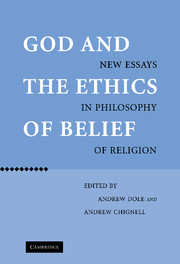Book contents
- Frontmatter
- Contents
- List of Contributors
- Acknowledgments
- The Ethics of Religious Belief: A Recent History
- PART ONE METAPHYSICS: GOD AND CREATURES
- PART TWO EPISTEMOLOGY: GOD AND THE ETHICS OF BELIEF
- PART THREE SOCIAL-POLITICAL PHILOSOPHY: GOD, ETHICS, AND BELIEF
- 8 The Epistemic Authority of Testimony and the Ethics of Belief
- 9 Kant on the Rational Instability of Atheism
- 10 Does Forgiveness Undermine Justice?
- 11 Can Good Christians Be Good Liberals?
- Index
9 - Kant on the Rational Instability of Atheism
Published online by Cambridge University Press: 25 July 2009
- Frontmatter
- Contents
- List of Contributors
- Acknowledgments
- The Ethics of Religious Belief: A Recent History
- PART ONE METAPHYSICS: GOD AND CREATURES
- PART TWO EPISTEMOLOGY: GOD AND THE ETHICS OF BELIEF
- PART THREE SOCIAL-POLITICAL PHILOSOPHY: GOD, ETHICS, AND BELIEF
- 8 The Epistemic Authority of Testimony and the Ethics of Belief
- 9 Kant on the Rational Instability of Atheism
- 10 Does Forgiveness Undermine Justice?
- 11 Can Good Christians Be Good Liberals?
- Index
Summary
This paper is about kant's view of people who are morally good but not theists. A Kant paper belongs in a collection about the ethics of belief because Kant's central project is to deny (put limits on) knowledge so as to make room for faith. There has been a significant change in Kant scholarship over the last ten or fifteen years. I would place as a key event the conference on Kant's philosophy of religion that produced the volume Kant's Philosophy of Religion Reconsidered in 1991. As the editors of that book put it, they question the commonly held view that Kant's account is “relentlessly reductionistic, (seeking) to make religion – or at least those elements of religion which can be critically justified – wholly identical with or reducible to morality.” This change in Kant scholarship is part of a much larger movement in the interpretation of the great figures of modern philosophy, of Leibniz, for example, and Descartes. The change is toward a greater emphasis on the vertical theme in these philosophers, on the relation to God. Kant's view, I am going to claim, is that there is incoherence in the attempt to be morally good without being a theist. But if this is right, it is even more important for us than it was for Kant to add that it is possible to be both morally good and not a theist, because we are likely to know many more such people, people who are both leading a morally good life and are not theists.
- Type
- Chapter
- Information
- God and the Ethics of BeliefNew Essays in Philosophy of Religion, pp. 202 - 218Publisher: Cambridge University PressPrint publication year: 2005
- 4
- Cited by



